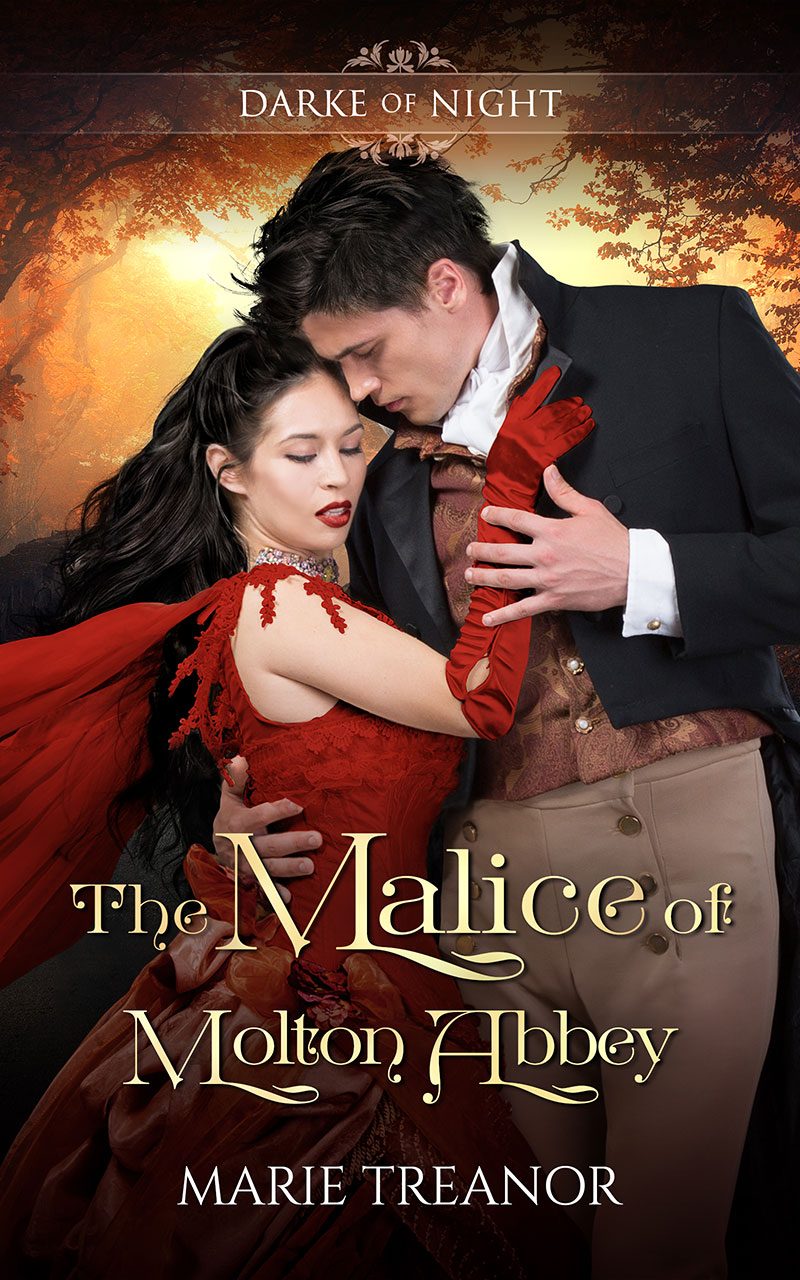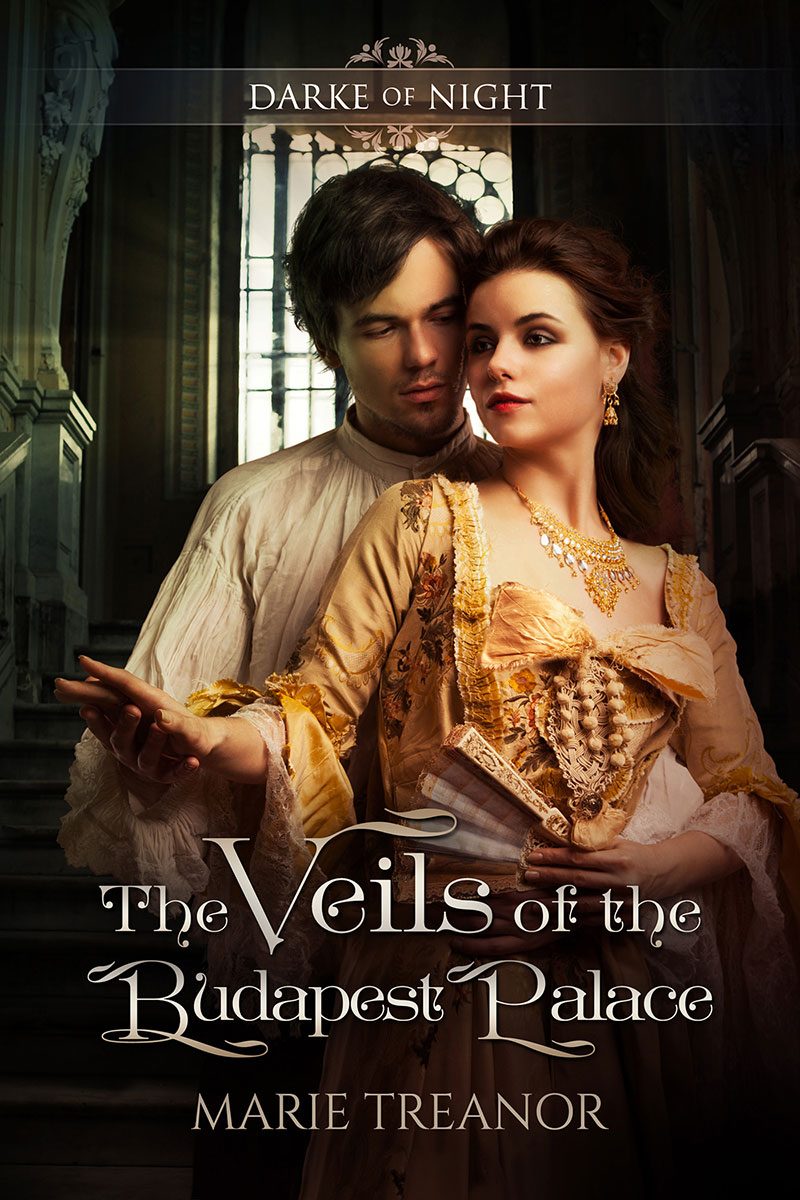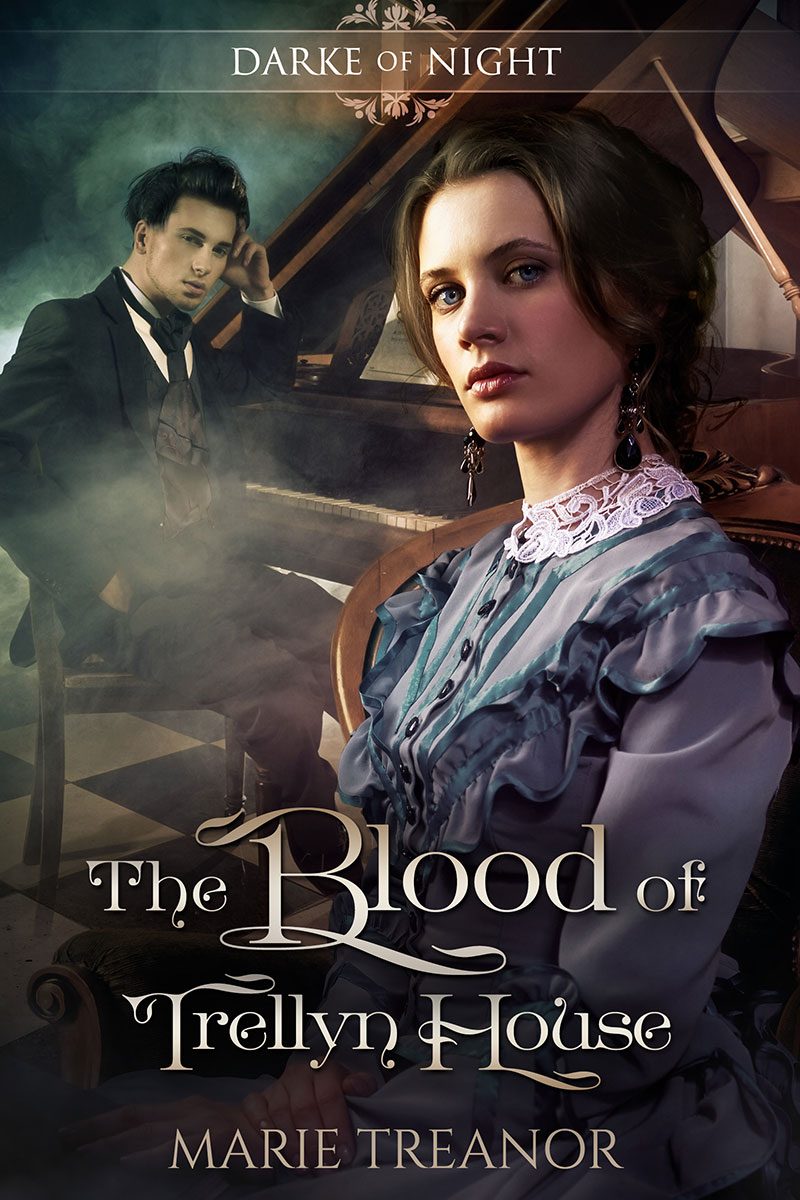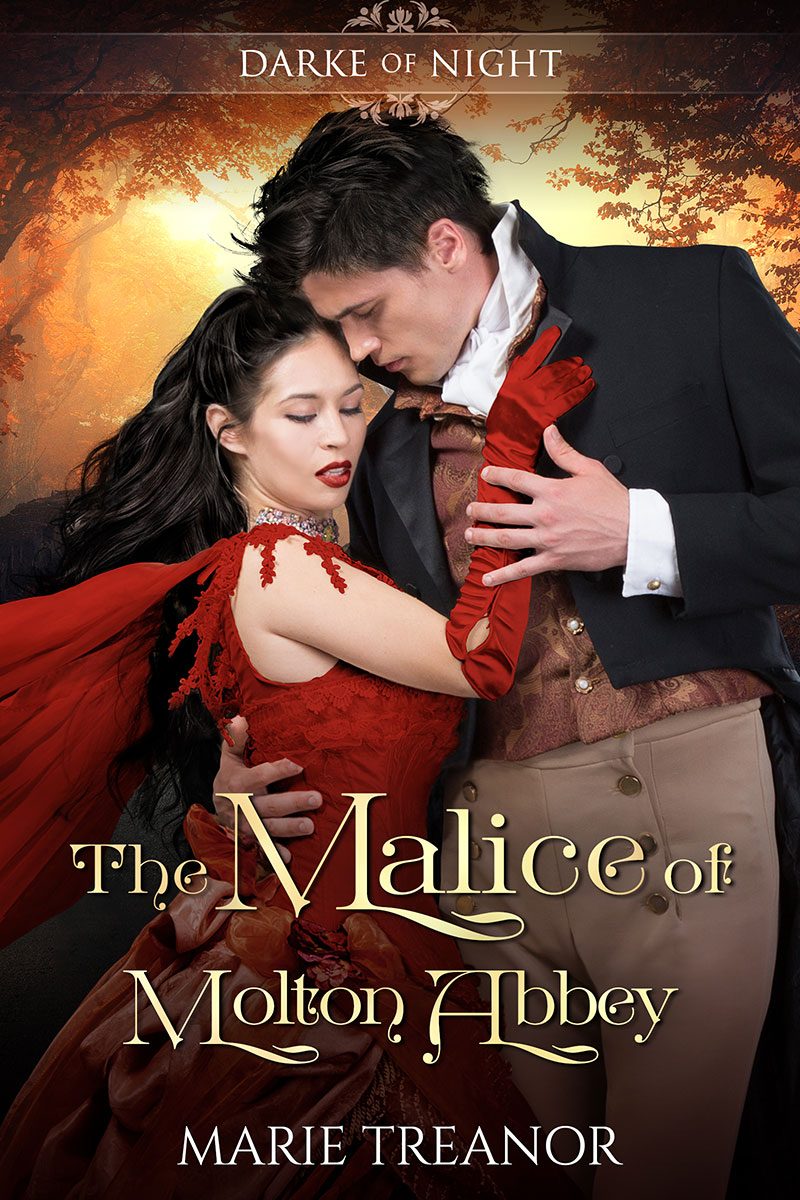
Darke of Night, Book 5
Prey to spiteful spirits and her own terrible past…
The mysterious Baroness von Damerin lives in a haunted house on the Scottish coast, with her young son and a collection of dotty and damaged relatives. Born Lilias Graham, she has many reasons to keep her presence secret, but circumstances bring the chaotic Goring family into her life, and with them the medium Barbara Darke …and charming Hungarian revolutionary exile, Bela Hiranyi.
Bela is everything she doesn’t want: dangerous, haunted, hopelessly desirable – and an exile from the state she just left. He has every reason to hate her late husband and may well be the threat to her son that she fears.
But Lilias has many fears, including the malice than haunts her house and the traitor who lurks among those she trusts the most. Is Bela yet another problem, or the solution? Lilias needs to discover before she falls too far under his spell – and before her enemies arrive to take her son.
You can buy this book at:
Chapter One
When Béla Hiranyi first came to Molton Abbey, I was kneeling on the roof with my hammer.
I had climbed up there to replace some slates which had blown off in the recent gales, but almost immediately, the light began to vanish. The haar, great clouds of mist from the sea, drifted in, scudding across the land, chilling and shrouding everything in swirling, opaque grey. Which was a pity because normally I loved the view from the roof. One could see for miles over the fields and the village to the gentle Fife hills and the road winding around the coast in both directions. On a clear day, you could look right over the waters of the Firth of Forth to Lothian and Edinburgh. Now, I could barely make out the sea. In a few minutes, it would be invisible. Even the eternally wailing seagulls had quietened.
Sighing, I reached for the third slate and hoped my visitors would find their way. I was expecting a Mr. Goring from Goring’s Bank, who was travelling in Scotland with his family, and Patrick Haggard, who had recommended them and would introduce us. The Haggards were long-time friends of my family. In a reckless moment, I had invited them all to tea, but I hadn’t expected quite so many coaches as began to thunder suddenly out of the mist.
Hastily, I hammered in the final nail in the third slate and placed the fourth one. More and more horses and carriages emerged from the swirling driveway, forming into a snorting, rumbling caravan that took up the entire front of the abbey.
Good God. There will never be enough scones to go round. Is it too late to bake more?
Fortunately, at least some of the coaches seemed to contain only baggage and servants. It was just the front few coaches whose doors opened and disgorged a small army. Children of various ages spilled out with great excitement and were herded toward the front steps by a young woman who made them pause to allow a middle-aged couple to sail through to the front. The young woman looked about her, then tipped back her head to look up at the roof. I hoped she couldn’t see me. Then a man, who might have been Patrick Haggard—it was a long time since we had last met—took her arm and accompanied her up the steps.
Relieved, I took a nail from between my lips, just as the door of one of the middle carriages opened once more and a young man stepped out, yawning prodigiously. Having no time to waste, I hastily hammered the nail into the slate. The young man looked up, craning his neck, and that was when I knew I was not entirely dead inside.
It might have been the mist swirling between us, but I had never seen anyone quite so handsome. A tangle of dark hair rumpled by travel or sleep, an impression of dark, refined beauty that was not remotely feminine. A man who turned heads and hearts.
Not that he would ever take mine. That organ was frozen inside me, at least where men were concerned. But I could look. I could appreciate and admire. And perhaps despise, a little.
Somehow, I knew he had seen me. Deliberately, I took the final nail from my lips and hammered it into the slate. Then I pulled myself up over the ridge and slid carefully down the other side. From there, it was a short drop to the lower roofed part of the house, which I managed in a swirl of petticoats before clambering down to the gutter where I had left the ladder.
It was no longer there.
My skin prickled. I knew I had come up this way. I hadn’t imagined that. Someone must have moved the ladder, though I couldn’t think why. I’d made no secret of my purpose, and it wouldn’t have been difficult to hear my hammering.
I shouldn’t have been surprised. Such things happened with increasing frequency in this house.
Malice.
I shivered. Suddenly, the mist seemed not just annoying, cold, and damp, but malevolent. And yet the mist had not moved my ladder. I bit my lips with annoyance, for with the house full of visitors, I didn’t want to yell for help. And, if I am honest, I didn’t want those visitors to see me on the roof looking like a builder’s labourer. Of course, the beautiful young man had already seen me, and possibly the woman with the children, but surely I could rely on distance and the haar to render me unrecognisable when we met again?
Muffled footsteps sounded, unhurried yet relentless. The mist disguised their location. Anyone could be down there, or up here. Any number of people.
Malice.
My blood ran cold. I peered into the haar all around me, even on the roof. And then, as though I had conjured him from my mind, the young man wandered out of the mist below. Silent, almost ghostly, he took my breath away. And my silly fear. He hadn’t gone into the house with the others, so I guessed he was not family but some kind of menial, a clerk or secretary of some kind to Mr. Goring, perhaps. I could probably ask him for help without losing the dignity I needed to maintain.
But before I could speak, he halted. As though sensing my presence, he turned and gazed up at me. A smile formed on his sensual lips. He placed his hand over his heart. “Fair goddess of the mist.”
“Of course I am,” I agreed. “Be so good as to look about you for a ladder and bring it to the goddess.”
To give him his due, he did peer into the mist round about him and farther along the wall. “Unless you know where it is, I would be quicker just catching you when you jump.”
Although he spoke English perfectly, he did so with a faint foreign accent. I did not trust foreigners at Molton Abbey, not when my son was here. “Goddesses don’t jump,” I said firmly. “Perhaps you would just look in the kitchen door and send John to me.”
“I would. Though it rather begs the question, why isn’t John up there instead of you? What kind of a mistress sends a girl up onto the roof?”
“One who is understaffed and desperate.” He didn’t know who I was. He thought I was a servant. Which meant he probably wouldn’t let me fall.
“Sit on the edge and jump,” he encouraged. “It isn’t so far.”
“I might knock you over,” I warned.
“It will be an honour to break the goddess’s fall.”
Without fuss, I sat on the edge of the roof, my legs dangling over the gutter. He moved closer and spread his arms. I drew in my breath and pushed off.
There was an instant of lightness, a dreamlike sense of flying, and then I landed against him with a thud that drove the breath from my body. His arms grasped me, unexpectedly hard and strong while my skirts settled. The mist folded around us, isolating us from the rest of the world—a foolish thought that was both alarming and strangely exciting.
This close, his face was still young and almost ridiculously handsome, but there were faint lines around his sensual mouth that spoke of unexpected suffering, and when I looked into his eyes, I saw a profound pain that I knew instinctively he never showed the world. The depth of it shocked me, scattering the witty words of thanks I had meant to throw his way as I pushed free and left him.
Even then, I suspected it would be difficult to despise this man, for he was not merely pretty. His body was too hard and strong, and the turbulence in his eyes spoke of something violent, something…dangerous.
Of course, he misunderstood my shock, but was clearly happy to take advantage of it.
“Fair goddess indeed,” he said softly, making no effort to put me down. His dark eyes kindled with teasing lust. “What is your name?”
“Lilias,” I replied. “What is yours?”
Slowly, he let my feet slide to the ground. My body, it seemed, could still remember desire. And it desired his, tall and lean and hard against mine.
“Béla Hiranyi,” he answered softly.
I blinked. “You are Hungarian.” I did not want anyone from the Austrian Empire running loose at the abbey. I stepped back, and he let me, dropping his arms at once.
He inclined his head, half in pride, half in self-mockery. I needed him where I could see him until he left here, not wandering the grounds where he could run into Andy at any time.
“Go around to the front of the house,” I instructed. “The baroness will be pleased to entertain you.” I turned my back on him to go in by the kitchen.
“And who are you in this household, Lilias?” he asked me.
“Its goddess, of course,” I called back into the mist.
I thought I heard his breath of laughter along with his fading footsteps.
Bolting along the back of the house and through the kitchen door, I found Mrs. MacFernie, Betty, and Lotte piling cakes and scones onto trays with the best tea set. John, presumably, had gone to open the door to the Hungarian, Béla Hiranyi. Andy, my five-year-old son, was jumping up and down with excitement, desperate to try Aunt Miriam’s new apple cake.
“Five minutes,” I gasped and flew past them, seizing Andy by the hand and rushing out of the kitchen and up the backstairs. He came willingly, laughing as we ran. Betty, despite her damp brow and dirty apron, walked after us with more dignity.
While waiting for her to catch up and join us in the bedchamber, I hastily washed my hands and face and brushed out my hair, repinning it simply and neatly while Betty unfastened my old gown. I donned the turquoise tea gown, which barely needed her assistance, and gave myself a quick glance in the mirror. With dark, unruly hair, thin, rather sharp features, and eyes the colour of smoke, I was not beautiful. But somehow I had developed the knack of making people forget this inconvenient fact. I had learned how to shine in any society. This afternoon, of course, I did not need to be beautiful, merely sensible.
It was a mark of pride in me never to look frightened. In this particular situation, I did not want to appear desperate either. I smoothed my brow, sighed, and turned to Andy, hesitating.
I hadn’t really planned to take him to tea with my visitors, since I wasn’t quite sure how the conversation would go. But then, I hadn’t expected the Gorings to arrive with coachfuls of children. And a Hungarian.
In the end, deciding it would be too mean to deprive him of both cake and other children on the same day, I took the chance and hurried downstairs with him.
My visitors had been settled in the drawing room. As we entered, I had the impression of a sea of relaxed people and comfortable laughter, and then a man detached himself from it and strode toward me with his hand held out.
Patrick Haggard, whom I had not seen for at least twelve years. From a wild, brooding youth, he had grown into a tall, harsh-faced man. He was a journalist now, producing a radically liberal political magazine that remained only just on the right side of sedition. From that, I had read his views of the late revolutions in Europe and the brutality with which they had been suppressed. I could guess his views of my husband.
The lively chatter in the room cut off. Everyone stood up. From the corner of my eye, I was aware of Béla Hiranyi gazing at me from the window. I hoped he was shocked, but I refused to look.
“Lilias!” Patrick said, smiling. At least his eyes still laughed. “At last. I have to say, I don’t think I would have recognised you from the twelve-year-old I last saw.”
“Well, you have changed too,” I returned, taking his hand. “You were a very glowery young man as I recall.”
“Oh, I still am,” he assured me. “I’ll show you later. For now, let me introduce you to your guests, Mr. and Mrs. Goring.” I walked to meet them at once, offering my hand to Mrs. Goring, a plump, motherly lady who had clearly once been very pretty and was still a handsome woman.
“Mrs. Goring,” I said. “I am so sorry to keep you waiting! In an old house like this, there is always an emergency at just the wrong moment.”
From the window, Béla Hiranyi emitted a hiss of laughter. No one else seemed to notice.
“Oh no,” Mrs. Goring said at once. “You must not apologise! We have just been admiring your beautiful room.”
The beautiful room could have done with a few coats of paint and new curtains, which I was sure she had noticed but would never mention. Except, hopefully, to her husband. I shook hands next with Mr. Goring, a surprisingly amiable man with twinkling eyes. I had expected him to be stern and hard, which he probably was inside. One didn’t have successful banks all over Europe by being foolishly soft-hearted.
“Baroness von Damerin,” he greeted me, bowing over my hand. “Honoured and delighted to meet you at last.”
“And the young Gorings,” Patrick pursued, “Miss Maria, Miss Vanessa and Miss Julia, Master George and Master Henry.”
“Goodness.” Solemnly, I acknowledged all the graceful bows and curtseys—they had been well taught. “You have a large family.”
“Larger even than this,” Mr. Goring said jovially. “We left our eldest son in London, studying for Oxford. And our eldest daughter is married—to Sir Salvador Carnwyth. Perhaps you know him?”
“I don’t believe…” I began.
“The pianist,” Patrick interposed, which suddenly tipped my memory.
“Ah! Sadly, I have never met him, but I heard him play in Vienna. A gifted musician.”
Mr. and Mrs. Goring looked gratified, and Patrick took the hand of the younger woman who had been watching the children’s bows like a hawk. The same lady who had glanced up at me through the mist as she’d walked up the front steps.
“And this is my wife,” he said with a rather touching pride. “Mrs. Barbara Haggard. Barbara, the Baroness von Damerin, whom I know better as Lilias Graham!”
Mrs. Haggard smiled and we shook hands. A shock of electricity shot up my fingers. For no reason, I thought in panic, She knows what I’ve done.
But of course, she could not know. Her large, rather beautiful eyes gazed directly into mine. I probably imagined the catch in her breath before she murmured something polite.
“Barbara is governess to the Goring children,” Patrick said.
“What an unusual arrangement,” I said, impressed.
“It suits us all,” Mr. Goring assured me.
“And last but not least,” Patrick said, “in his own eyes at least, is the boys’ tutor, Prince Hiranyi.”
In fresh shock, I gazed up at the Hungarian. If he had been surprised to discover I was the baroness, the tables were now turned with a vengeance.
“Prince Hiranyi,” I said, unable to help the faintest emphasis.
I gave him my hand, and he bowed over it punctiliously. But his eyes no longer laughed or flirted. They were hard as agates. And he dropped my hand at once.
“Bizarre, isn’t it?” Mr. Goring remarked. “Who’d have ever thought I’d end up with a prince teaching my children?”
Of course, the fact that this prince was tutoring surely told me what I needed to know. He had to be a refugee from the Hungarian revolutionary war. He was the enemy of my Austrian in-laws, not their friend.
With relief, I drew Andy forward. “This is my son, Andrew,” I said proudly to everyone. In Austria, he had been Andreas, but he liked the translation, and, in any case, I generally called him Andy.
Painfully shy, he smiled hopefully at the children and clung harder to my hand.
“The new Baron von Damerin?” Prince Hiranyi asked. His eyes and his voice both challenged me.
“In name,” I allowed. “But I prefer to think of him as the heir to Molton Abbey. Ah, and here is tea. Please, let us sit and be comfortable.”
Suddenly, it seemed a long time since I had entertained anyone. I, the hostess of glittering Viennese balls and sought-after country house parties attended by royalty and the most powerful nobility, felt gauche entertaining one banker and his family in my own home.
“It is so good of you to come and see me here,” I said to Mr. Goring as I poured tea. “I could easily have come to Edinburgh—or London, with a little more effort.”
“But then why should you when I am passing anyway?” Mr. Goring said kindly, although his eyes were shrewd and considering. I decided I liked that in a man of business. “After tea, we shall have a private chat, if you wish, and you must tell me how I can serve you. Perhaps you have a solicitor to look after your interests?”
I smiled, and Patrick’s wife took the cup from my hand to ferry it to Mrs. Goring. “I look after my own interests where I can. For the rest, I hope you can help.”
At last, everyone was served with tea and scones—cut daintily in two to go round—or cake, according to preference. Fortunately, the younger Goring children seemed to absorb Andy and bring him out of his shyness, and I was pleased that they weren’t made to sit still and silent like so many children in adult company. Patrick’s wife, whom they called Mrs. Darke rather than Mrs. Haggard for some reason, only intervened when they grew too boisterous. And Prince Hiranyi barely seemed to notice them. Restless and brooding, he paced about the room, occasionally perching on the arm of Mrs. Haggard’s chair before again shifting position.
“How long have you lived here, Baroness?” Mr. Goring asked.
“I was born here,” I replied. “It has been my family’s home for more than two hundred years. Of course, it is not really an abbey, merely built on the site of where an abbey used to be before it was destroyed during the Reformation. But we do have a bit of a ruined chapel in the garden, which I will show you if the haar ever lifts!”
“What took you to Austria?” Mrs. Goring asked me curiously.
“My parents. They were inveterate travellers. When I was a child, they often left me behind with my aunt and uncle, but as I grew up, they took me with them. I’ve been privileged to see a great deal of the world.”
“And that is when you met your husband?” Mrs. Goring asked with sympathy.
I inclined my head.
“I am so sorry for your tragic loss,” she said sincerely. “Mr. Haggard told us he survived the war only to die in a boating accident on his own estate. What an unkind fate!”
“It was,” I agreed. “Most unkind.”
“He was a great soldier, I apprehend,” Mr. Goring put in.
“The Emperor honoured him for his service,” I said, as I always did. I did not look at Prince Hiranyi, though I couldn’t help wondering if he’d heard of my husband or even fought against him.
“Revolution is a terrible thing,” Mr. Goring said heavily. “Such upheaval and suffering. A man who can remain loyal and honourable throughout such turbulence is a great man indeed. On either side, eh, Hiranyi?”
The tutor’s lip curled. “As you say, sir.”
“How long have you been back in Scotland?” Mrs. Haggard asked.
“Just a few months. But talking of travelling here, how did you cross the Forth with all your carriages?”
“Hired ’em to meet us at Burntisland,” Mr. Goring said carelessly, “since we were coming here and mean to go on to St. Andrews. We took the train ferry from Granton, which is quite astounding.”
“They drove the train right onto the boat!” one of the Goring boys exclaimed with enthusiasm.
“I know! I am always sure we’re going straight off the other end and into the sea,” I confessed. “But we never have yet. And you made it just in time before the mist.”
“Do you get such mists a lot?” Patrick asked me.
“Oh yes, though this one is particularly thick and impenetrable. It should lift quite soon, I hope. In the meantime, Mr. Goring, perhaps we should take our dull business discussion into the study.” I smiled at Mrs. Goring. “Please make yourself at home. I shall not keep your husband a moment longer than is strictly necessary. If the children wish to go up to the nursery with Andy, they are welcome. Just don’t annoy your aunts and uncle, Andy.”
“Oh no,” Andy replied as though shocked at the very thought. I cast him a look that made him grin. His smiles were better, more frequent these days, which lifted my heart.
I led Mr. Goring from the drawing room and down the passage to the room I used as my office. With him, I knew, there was no point in pretending. So I was blunt.
“You will have noticed that the house is in need of repair,” I said as I closed the door and gestured him to sit by the desk. “The estate is in the same condition. I can bring them both round in time, but not without money.”
“But you do not wish to borrow,” Mr. Goring guessed.
I gave him a crooked smile. “What would you lend me with the abbey as security? Not much, I suspect! The truth is, I have money, but it is abroad, in Austria, and I need access to it.”
“This is the fortune left to you by your husband?”
I nodded. “And the moneys derived from the Austrian estates, which are my son’s. My husband’s family is insisting we go home before they release them. I do not wish to return to Austria, but I have not been able to engage a solicitor to act for me over there. The Damerins have no control over my personal fortune, of course, but I do need the means to get my hands on it! Patrick said you could help me there.”
“That will be no problem. I have a branch in Vienna.”
“And can this happen quickly?” I urged. I tried a deprecating smile. “To be frank, sir, without this, I have no money to pay my servants or even feed my family beyond the next couple of weeks.”
“Of course,” Mr. Goring said at once. “I investigated the situation when Patrick first approached me on your behalf. The bank will happily advance you what you need until your money comes through from Vienna.”
I smiled at him as several huge weights seemed to slip away from my shoulders.










